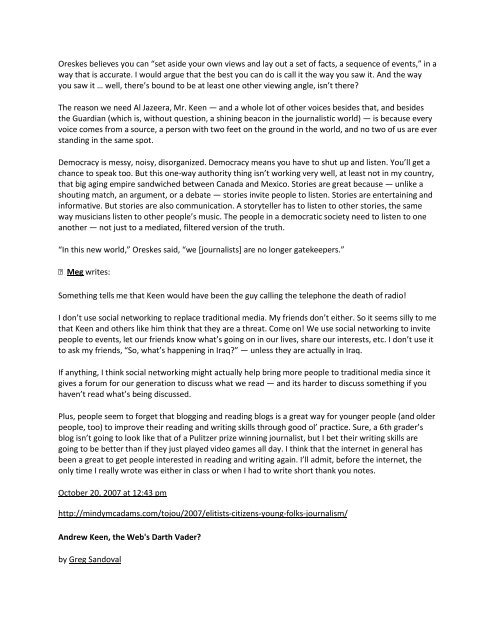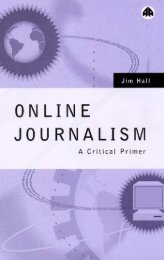Modul Mata Kuliah Journalisme Online - Ayo Menulis FISIP UAJY
Modul Mata Kuliah Journalisme Online - Ayo Menulis FISIP UAJY
Modul Mata Kuliah Journalisme Online - Ayo Menulis FISIP UAJY
You also want an ePaper? Increase the reach of your titles
YUMPU automatically turns print PDFs into web optimized ePapers that Google loves.
Oreskes believes you can “set aside your own views and lay out a set of facts, a sequence of events,” in a<br />
way that is accurate. I would argue that the best you can do is call it the way you saw it. And the way<br />
you saw it … well, there’s bound to be at least one other viewing angle, isn’t there?<br />
The reason we need Al Jazeera, Mr. Keen — and a whole lot of other voices besides that, and besides<br />
the Guardian (which is, without question, a shining beacon in the journalistic world) — is because every<br />
voice comes from a source, a person with two feet on the ground in the world, and no two of us are ever<br />
standing in the same spot.<br />
Democracy is messy, noisy, disorganized. Democracy means you have to shut up and listen. You’ll get a<br />
chance to speak too. But this one-way authority thing isn’t working very well, at least not in my country,<br />
that big aging empire sandwiched between Canada and Mexico. Stories are great because — unlike a<br />
shouting match, an argument, or a debate — stories invite people to listen. Stories are entertaining and<br />
informative. But stories are also communication. A storyteller has to listen to other stories, the same<br />
way musicians listen to other people’s music. The people in a democratic society need to listen to one<br />
another — not just to a mediated, filtered version of the truth.<br />
“In this new world,” Oreskes said, “we [journalists] are no longer gatekeepers.”<br />
Meg writes:<br />
Something tells me that Keen would have been the guy calling the telephone the death of radio!<br />
I don’t use social networking to replace traditional media. My friends don’t either. So it seems silly to me<br />
that Keen and others like him think that they are a threat. Come on! We use social networking to invite<br />
people to events, let our friends know what’s going on in our lives, share our interests, etc. I don’t use it<br />
to ask my friends, “So, what’s happening in Iraq?” — unless they are actually in Iraq.<br />
If anything, I think social networking might actually help bring more people to traditional media since it<br />
gives a forum for our generation to discuss what we read — and its harder to discuss something if you<br />
haven’t read what’s being discussed.<br />
Plus, people seem to forget that blogging and reading blogs is a great way for younger people (and older<br />
people, too) to improve their reading and writing skills through good ol’ practice. Sure, a 6th grader’s<br />
blog isn’t going to look like that of a Pulitzer prize winning journalist, but I bet their writing skills are<br />
going to be better than if they just played video games all day. I think that the internet in general has<br />
been a great to get people interested in reading and writing again. I’ll admit, before the internet, the<br />
only time I really wrote was either in class or when I had to write short thank you notes.<br />
October 20, 2007 at 12:43 pm<br />
http://mindymcadams.com/tojou/2007/elitists-citizens-young-folks-journalism/<br />
Andrew Keen, the Web's Darth Vader?<br />
by Greg Sandoval
















